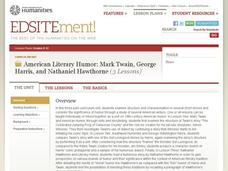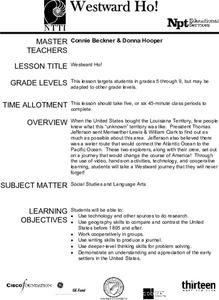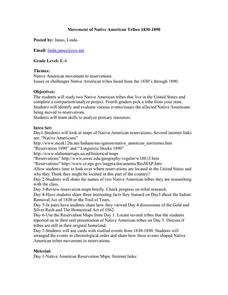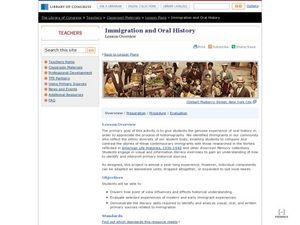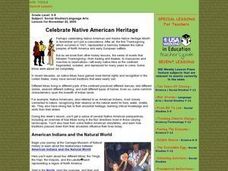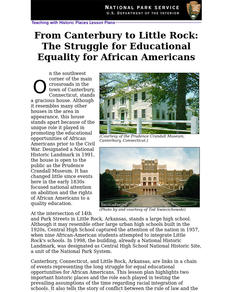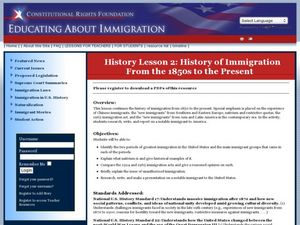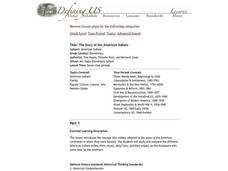Memorial Hall Museum
Problems and Events Leading Up To the Attack of 1704
Groups read primary and secondary sources detailing the ambush at Bloody Brook on September 18, 1675 and the attack on The Falls in May of 1676. After examining the results of each attack, groups reflect on the language used in the...
National Endowment for the Humanities
American Literary Humor: Mark Twain, George Harris, and Nathaniel Hawthorne
Nathaniel Hawthorne as a humorist? Really? The three lessons in this series focus on the the storytelling style, conventions, and literary techniques employed by Hawthorne, George Washington Harris, and Mark Twain.
Curated OER
Westward Ho!
For any teacher of American History, The Lewis and Clark Expedition is a watershed event that should be shared with your students. This is a very good lesson on the Expedition, and the events that led up to it; including The Lousisiana...
Curated OER
What Was South Carolina's Role in the Spanish American War?
Seventh graders investigate the role of South Carolina in the Spanish American War. In this imperialism lesson plan, 7th graders analyze primary documents and photographs, in collaborative groups, to determine how the state was involved...
Curated OER
Early American Education and Horace Mann
Students analyze the contributions of Horace Mann. In this public education lesson, students research Internet and print sources regarding the history of American education, Mann.s life, the Morrill Act of 1862, and the Northwest Ordinance.
Curated OER
Movement of Native American Tribes 1830-1890
Students examine the movement of Native American tribes during the mid 1800's. In this American History lesson, students study two Native American tribes that live in the United States and complete a comparison/analyze project. Students...
Stanford University
Native Californians and the Portola Expedition
What was California like before the Spanish came? Class members discover the answer to the question using images of Native Americans and diaries of the early Spanish explorers. Scaffolded activities allow instructors to adapt the...
Roy Rosenzweig Center for History and New Media
Founding Documents
Teach the class about the predecessor to Declaration of Independence—the Virginia Declaration of Rights. Using the foundational documents, scholars examine the two writings to consider how they are similar and how they are different. A...
Simon & Schuster
A Teacher's Guide to 1776 by David McCullough
David McCullough's Pulitzer Prize-winning novel, 1776, is the focus of a 28-page teacher's guide. The guide includes pre-reading questions, background information about key British and American figures, and chapter-by-chapter lessons.
Judicial Learning Center
Civil Rights and Equal Protection
Almost every American is familiar with the Supreme Court case of Brown vs. Board of Education. Far fewer understand the constitutional reasoning or the wide-ranging consequences of the ruling in the field of criminology. The interesting...
Stanford University
Annexation of Hawaii
Once an independent nation, Hawaii became part of the United States only after a business-sponsored coup of its queen. After examining newspapers from the 1890s, learners consider whether native Hawaiians wished to become Americans at...
Stanford University
Expansion of the Inca Empire
If you could write your own history textbook, what would you include? Learners play the role of textbook writers by examining evidence of the Inca Empire. With primary sources from Spanish and indigenous perspectives, as well as images,...
Curated OER
Settlement Exploration: Then and Now
NASA has crafted an imaginative and memorable series of lessons, "NASA and Jamestown Education Module." This instructional activity is one of the five components. In it, middle schoolers connect history and science by comparing the...
Curated OER
Paul Revere's Ride and the American Revolution
Students analyze the cause, results, and critical historic figures and events of the American Revolution. In this American Revolution lesson, students review Paul Revere's significance and the Battles of Lexington and Concord. Students...
Curated OER
Immigration and Oral History
Students examine immigration. In this oral and social histories lesson plan, students analyze primary sources to research immigration history in their community. In this year-long research project, students participate in visual and...
Curated OER
Celebrate Native American Heritage
Students examine Native American heritage. They explore a museum of Native American culture and explore their food, dress, and customs. They also explore the Native Americans role in the first Thanksgiving.
PBS
African-Americans in the American West
Secondary learners explore the westward movement of African Americans. Segmented into four time periods, the lesson provides an overview of how African Americans experienced westward expansion. Learners view PBS specials on the westward...
Curated OER
From Canterbury to Little Rock: The Struggle for Educational Equality for African Americans
Students explain the magnitude of the struggle involved in securing equal educational opportunities for African Americans. They examine how Prudence Crandall challenged the prevailing attitude toward educating African Americans
Curated OER
History of Immigration From the 1850's to the Present
Eleventh graders study the history of immigration from 1850 to the present. In this American History instructional activity, 11th graders compare the 1924 and 1965 immigration acts and give a reasoned opinion on each. Students...
Scholastic
The Flight of Amelia Earhart Teaching Guide
Amelia Earhart's accomplishments and strength of character extend beyond her status as one of the first female aviators in America. Elementary and middle schoolers learn about Earhart's early life and the historical context surrounding...
Constitutional Rights Foundation
Women in the Military
Scholars analyze the role of women in the military in United States history. Using group research, debate, and diary entries, they explore various military activity in America. To complete the lesson, young historians write an essay...
Museum of Tolerance
The Role of Citizens in a Participatory Democracy
Groups research participatory democracies and compare the role and rights of citizens in ancient history with those in recent U.S. history. Guided by a series of questions, individuals compose a persuasive essay in which they discuss the...
Curated OER
Dramatizing History in Arthur Miller's The Crucible
Young scholars study the effect of history on fictional or dramatic works of art by reading, Arthur Miller's, The Crucible. They examine the ties between a nation's history and culture with the literature it produces.
Curated OER
American Indians
Students research early Indian adaptations in this lesson. They research the different American Indian tribes. They also research and compare the tribes' rituals, daily lives, and their impact on the Europeans who came later to the...



